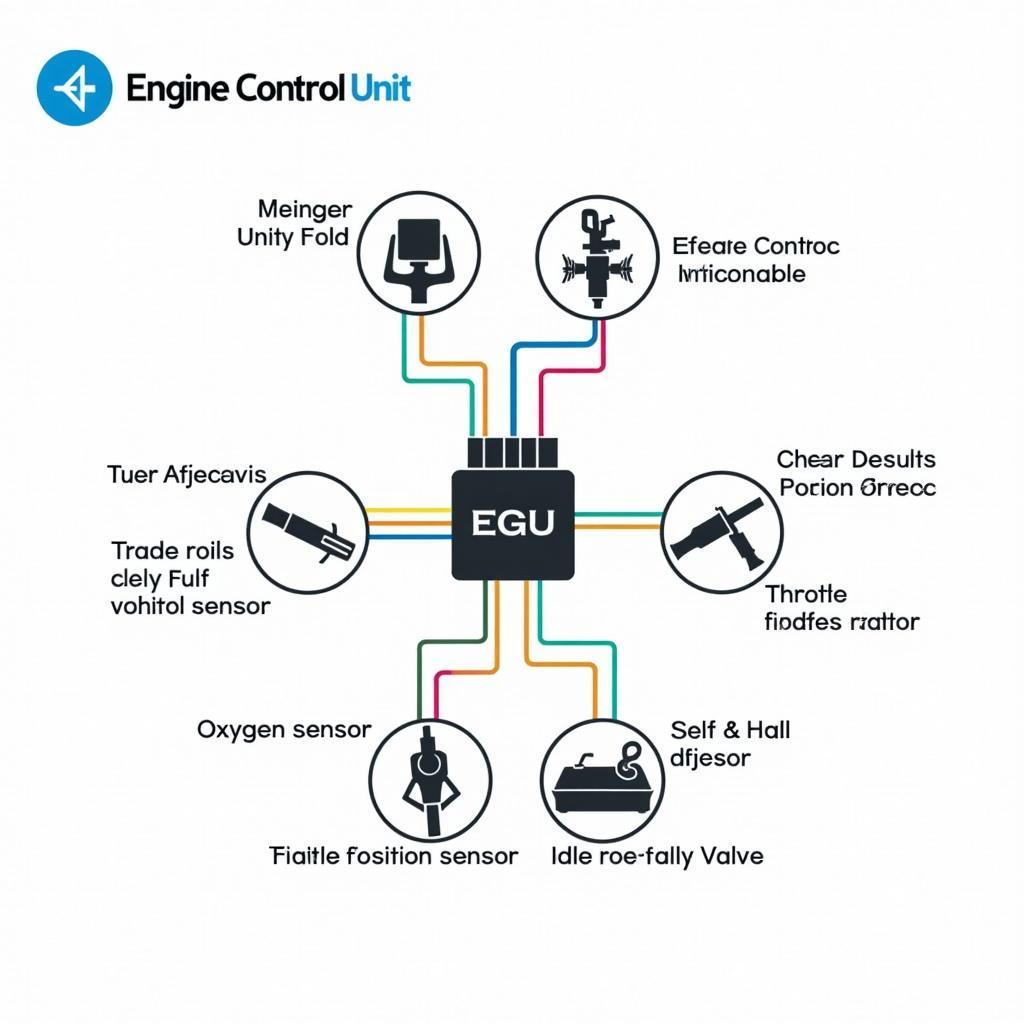Modern vehicles rely heavily on sophisticated electronic systems to optimize performance, fuel efficiency, and emissions. At the heart of this intricate network lies the car engine management system (EMS), a computerized marvel that monitors and controls various aspects of your engine’s operation. When issues arise within this critical system, accurate diagnostics and effective repairs are essential to restore your vehicle’s performance and prevent further damage.
 Car Engine Management System Components
Car Engine Management System Components
Understanding the Car Engine Management System
The car engine management system acts as the brain of your vehicle, constantly analyzing data from various sensors to make real-time adjustments and ensure optimal engine performance. Here’s a simplified breakdown of its key functions:
- Fuel Delivery: The EMS precisely regulates the amount of fuel injected into the engine based on factors like engine speed, load, and throttle position. This ensures efficient combustion and minimizes emissions.
- Air Intake Control: By monitoring the air entering the engine, the EMS adjusts the air-fuel mixture for optimal performance and minimal pollution.
- Ignition Timing: The EMS determines the precise moment to ignite the air-fuel mixture in each cylinder, optimizing power output and fuel efficiency.
- Emissions Control: The system monitors and regulates exhaust gases to minimize harmful emissions and ensure compliance with environmental standards.
Common Symptoms of Engine Management System Problems
A malfunctioning EMS can manifest in a variety of ways, impacting your vehicle’s performance, drivability, and even your safety. Some common symptoms include:
- Check Engine Light: The most obvious indicator, this warning light on your dashboard often signals an issue within the EMS.
- Reduced Fuel Efficiency: If you notice a sudden drop in your gas mileage, it could be a sign of an EMS problem affecting fuel delivery or combustion.
- Rough Idling or Stalling: A rough or erratic idle, or even stalling, can occur due to faulty sensors providing inaccurate data to the EMS.
- Loss of Power or Hesitation: Problems with ignition timing or fuel delivery can lead to a noticeable decrease in engine power or hesitation during acceleration.
- Increased Emissions: A malfunctioning EMS can disrupt emissions control systems, resulting in higher levels of harmful pollutants.
Car Engine Management System Diagnostics: Unraveling the Mystery
When your vehicle exhibits symptoms of EMS trouble, accurate diagnostics are paramount. Here’s a glimpse into the diagnostic process:
- Visual Inspection: A trained technician will begin by visually inspecting the engine bay for any obvious issues like loose connections, damaged wiring, or vacuum leaks.
- OBD-II Scan: Using an On-Board Diagnostics (OBD-II) scanner, the technician can retrieve Diagnostic Trouble Codes (DTCs) stored in the vehicle’s computer. These codes provide valuable clues about the nature of the problem.
- Sensor Testing: The technician will test various sensors crucial to the EMS, such as the mass air flow sensor, oxygen sensor, and throttle position sensor, to ensure they’re functioning correctly.
- Component Analysis: Further diagnostics may involve analyzing the performance of individual components like fuel injectors, ignition coils, or the EGR valve to pinpoint the root cause of the issue.
Car Engine Management System Repairs: Restoring Peak Performance
Once the diagnostic process identifies the source of the problem, the appropriate repairs can be carried out. Some common EMS repairs include:
- Sensor Replacement: Faulty sensors are often replaced to restore accurate data input to the EMS.
- Component Repair or Replacement: Damaged or malfunctioning components like fuel injectors, ignition coils, or the throttle body may require repair or replacement.
- Wiring and Connector Repairs: Loose, corroded, or damaged wiring or connectors can disrupt communication within the EMS and necessitate repair.
- Software Updates: In some cases, updating the engine control unit (ECU) software can resolve software glitches or compatibility issues.
“Accurate diagnostics are the cornerstone of effective car engine management system repairs,” says John Miller, a seasoned automotive engineer with over 20 years of experience. “Addressing the root cause, rather than simply treating symptoms, ensures long-term reliability and prevents recurring issues.”
The Importance of Professional Diagnostics and Repairs
While some DIY enthusiasts may be tempted to tackle EMS issues themselves, the complexity of these systems often necessitates professional expertise. Here’s why:
- Specialized Equipment: Professional mechanics have access to advanced diagnostic tools and equipment, enabling them to accurately pinpoint problems.
- Technical Expertise: Diagnosing and repairing EMS problems require a deep understanding of automotive electronics, software, and mechanical systems, which qualified technicians possess.
- Safety Concerns: Working on electrical systems in a vehicle can pose safety risks if not handled properly, making professional intervention essential.
FAQ: Your Car Engine Management System Questions Answered
Q: How often should I have my car’s engine management system checked?
A: It’s generally recommended to have your vehicle’s EMS inspected annually or as part of your regular maintenance schedule.
Q: Can I drive my car with the check engine light on?
A: While you might be able to drive short distances, it’s crucial to get the issue diagnosed and repaired promptly. Ignoring the warning light could lead to further damage and more costly repairs down the line.
Q: How much do car engine management system repairs typically cost?
A: The cost of repairs can vary significantly depending on the nature of the problem, the make and model of your vehicle, and labor rates in your area. It’s best to consult a qualified mechanic for an accurate estimate.
Need Assistance with Your Car Engine Management System?
Is your vehicle experiencing performance issues or displaying warning lights? Don’t let a faulty engine management system leave you stranded. Our team of expert technicians at DiagFixPro is here to help. We specialize in comprehensive car engine management system diagnostics and repairs, utilizing the latest technology and industry best practices to get your vehicle back on the road safely and efficiently.
Contact us today via WhatsApp: +1(641)206-8880 or Email: [email protected]. Our dedicated customer support team is available 24/7 to answer your questions and schedule an appointment.

Leave a Reply